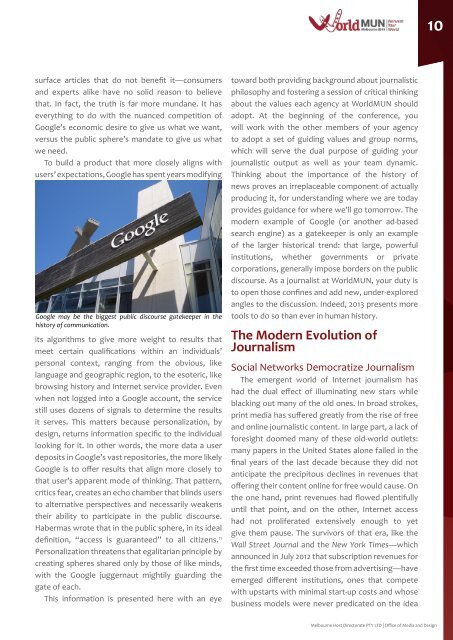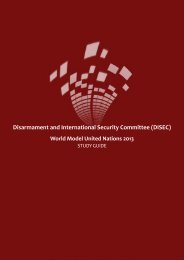Press Corps - World Model United Nations
Press Corps - World Model United Nations
Press Corps - World Model United Nations
Create successful ePaper yourself
Turn your PDF publications into a flip-book with our unique Google optimized e-Paper software.
surface articles that do not benefit it—consumers<br />
and experts alike have no solid reason to believe<br />
that. in fact, the truth is far more mundane. it has<br />
everything to do with the nuanced competition of<br />
Google’s economic desire to give us what we want,<br />
versus the public sphere’s mandate to give us what<br />
we need.<br />
To build a product that more closely aligns with<br />
users’ expectations, Google has spent years modifying<br />
Google may be the biggest public discourse gatekeeper in the<br />
history of communication.<br />
its algorithms to give more weight to results that<br />
meet certain qualifications within an individuals’<br />
personal context, ranging from the obvious, like<br />
language and geographic region, to the esoteric, like<br />
browsing history and Internet service provider. Even<br />
when not logged into a Google account, the service<br />
still uses dozens of signals to determine the results<br />
it serves. This matters because personalization, by<br />
design, returns information specific to the individual<br />
looking for it. In other words, the more data a user<br />
deposits in Google’s vast repositories, the more likely<br />
Google is to offer results that align more closely to<br />
that user’s apparent mode of thinking. That pattern,<br />
critics fear, creates an echo chamber that blinds users<br />
to alternative perspectives and necessarily weakens<br />
their ability to participate in the public discourse.<br />
Habermas wrote that in the public sphere, in its ideal<br />
definition, “access is guaranteed” to all citizens. 11<br />
Personalization threatens that egalitarian principle by<br />
creating spheres shared only by those of like minds,<br />
with the Google juggernaut mightily guarding the<br />
gate of each.<br />
this information is presented here with an eye<br />
toward both providing background about journalistic<br />
philosophy and fostering a session of critical thinking<br />
about the values each agency at <strong>World</strong>MUN should<br />
adopt. At the beginning of the conference, you<br />
will work with the other members of your agency<br />
to adopt a set of guiding values and group norms,<br />
which will serve the dual purpose of guiding your<br />
journalistic output as well as your team dynamic.<br />
Thinking about the importance of the history of<br />
news proves an irreplaceable component of actually<br />
producing it, for understanding where we are today<br />
provides guidance for where we’ll go tomorrow. The<br />
modern example of Google (or another ad-based<br />
search engine) as a gatekeeper is only an example<br />
of the larger historical trend: that large, powerful<br />
institutions, whether governments or private<br />
corporations, generally impose borders on the public<br />
discourse. As a journalist at <strong>World</strong>MuN, your duty is<br />
to open those confines and add new, under-explored<br />
angles to the discussion. indeed, 2013 presents more<br />
tools to do so than ever in human history.<br />
The Modern Evolution of<br />
Journalism<br />
Social Networks Democratize Journalism<br />
the emergent world of internet journalism has<br />
had the dual effect of illuminating new stars while<br />
blacking out many of the old ones. In broad strokes,<br />
print media has suffered greatly from the rise of free<br />
and online journalistic content. In large part, a lack of<br />
foresight doomed many of these old-world outlets:<br />
many papers in the united States alone failed in the<br />
final years of the last decade because they did not<br />
anticipate the precipitous declines in revenues that<br />
offering their content online for free would cause. On<br />
the one hand, print revenues had flowed plentifully<br />
until that point, and on the other, internet access<br />
had not proliferated extensively enough to yet<br />
give them pause. The survivors of that era, like the<br />
Wall Street Journal and the New York Times—which<br />
announced in July 2012 that subscription revenues for<br />
the first time exceeded those from advertising—have<br />
emerged different institutions, ones that compete<br />
with upstarts with minimal start-up costs and whose<br />
business models were never predicated on the idea<br />
10<br />
Melbourne Host Directorate PTY LTD | Office of Media and Design
















